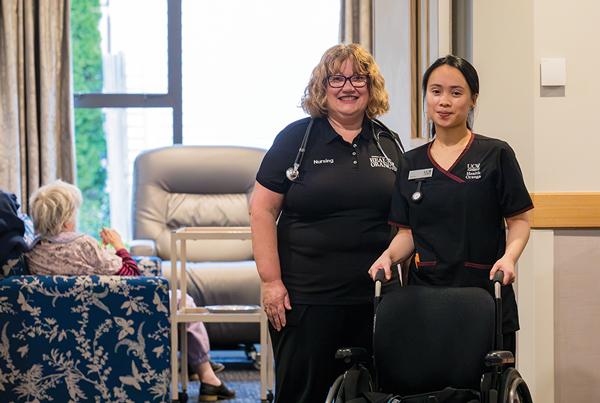
NORTH & SOUTH + University of Canterbury

UC Faculty of Health Executive Dean Cathy Andrew alongside current student Leianne Roblete
An answer to the nursing shortage
In a bold move to address New Zealand’s critical nursing shortage, Te Whare Wānanga o Waitaha | University of Canterbury (UC) announces a programme combining online learning with onsite clinical placements.
Meeting a national need with local solutions
New Zealand’s healthcare system faces a significant challenge: a growing shortage of qualified nurses, especially in remote and underserved regions. UC’s Master of Health Sciences (Nursing) programme addresses this issue head-on by offering a streamlined pathway for individuals with undergraduate health- related degrees to become registered nurses in just two years, providing a swift and effective solution to bolster the healthcare workforce.
“Our new programme is not just about filling the gaps,” says Associate Professor Cathy Andrew, Amo Matua | Executive Dean Faculty of Health at UC. “It’s about empowering individuals with the knowledge and skills they need to make a meaningful impact in their communities.”
Flexible learning for modern lives
A standout feature of this master’s programme is its flexible learning model. Offered through Tuihono UC | UC Online, students can tailor their education to fit their busy lives. Whether juggling work, family, or other commitments, UC’s online platform allows them to learn at their own pace and from any location.
“We understand that life doesn’t stop when you decide to further your education,” says Associate Professor Andrew. “Our programme is designed to be as accommodating as possible, so you can balance your studies with your personal and professional responsibilities.”
One of this year’s Master of Health Sciences (Nursing) students Gendi Roberts, says studying via distance has allowed her to pursue her academic interests while maintaining her job and home life in Nelson.
“Studying this way has been crucial as an anaesthetic technician, allowing me to prioritise my studies and expand my scope of practice while undertaking placements in my region,” she says.
Toni Raimona (Ngāi Tahu, Ngāti Awa), also studying this year, says, “As a 39-year-old working full-time, I need flexibility. Financially, I need to keep my clinical service manager role, and the two-year course is a short-term sacrifice for long-term gain. This programme makes me more versatile in what I can give back to my whānau.”
Leianne Roblete, another working student, appreciates the course’s flexibility. “The blended learning allows me to organise my study time and working schedule because modules and also assignments are provided weeks in advance,” she says. “The weekly tutorial sessions help me stay on top of things and connect with my lecturers and other students.”
Strengthening communities
A unique aspect of the programme is its emphasis on local community support. By allowing students to remain in their home regions while they study, UC fosters stronger community ties and encourages graduates to work locally after completing their degrees. This approach not only addresses the immediate need for nurses but also contributes to the long-term health and stability of communities across New Zealand.
“Staying connected to their communities while they study means our graduates are more likely to stay and work in those areas,” explains Associate Professor Andrew. “It’s a win-win situation: students get a high-quality education, and local healthcare systems benefit from retaining skilled professionals.”
Collaborative and inclusive
UC’s commitment to collaboration and inclusivity is at the heart of this programme. The University actively seeks to create an environment where all students feel valued and supported. By promoting equity and accessibility, UC ensures that everyone, regardless of their background, has the opportunity to succeed.
“We believe in the power of diverse perspectives and experiences,” says Associate Professor Andrew. “Our goal is to create a learning environment that reflects the richness of our society and prepares students to serve a diverse population.”
Join us on this journey
“Education is a journey, and we’re here to guide students every step of the way,” says Associate Professor Andrew. “Together, we can make a real difference in the health and well-being of our communities.”
With this innovative programme, UC is not just responding to the immediate needs of the healthcare system; it is shaping the future of nursing in New Zealand.
For more information about the Master of Health Sciences (Nursing) programme and how to apply, visit canterbury.ac.nz.
